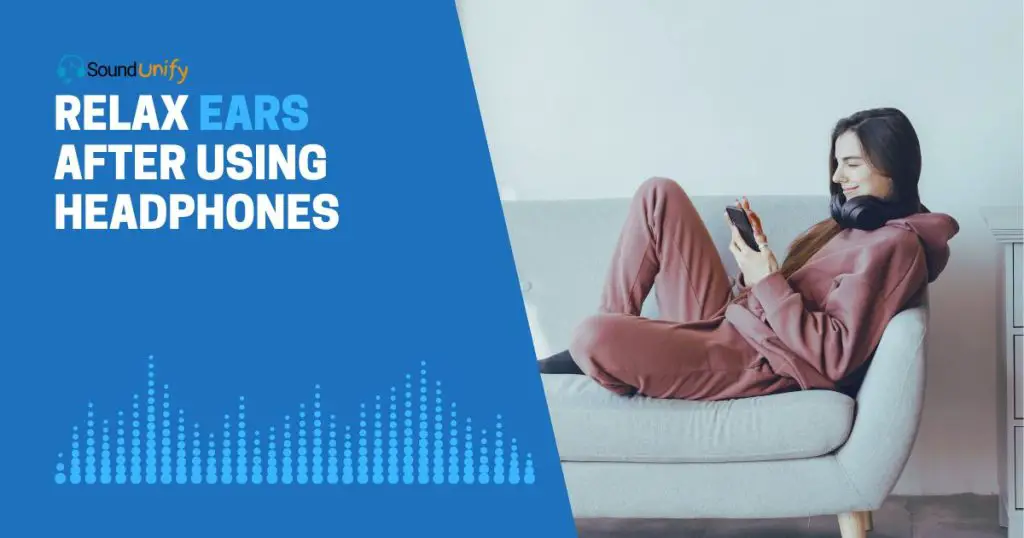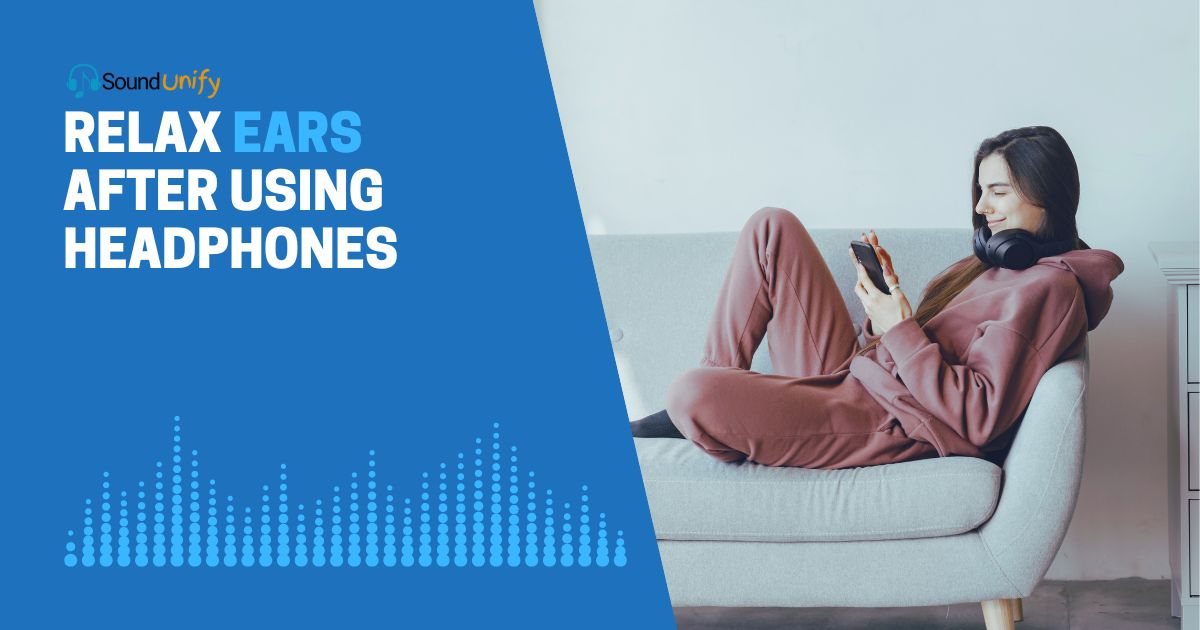Give your ears a break and restore their natural balance after extended headphone use. Here's how to relax your ears and prevent discomfort.
I know the feeling all too well. You’ve been lost in your favorite music or engrossed in an audiobook, and suddenly you realize your ears are begging for a break. The pressure and slight ringing are all too familiar for us headphone users.
We often overlook the strain we put on our ears until the discomfort sets in. But it doesn’t have to be this way. With a few simple techniques and preventative measures, you can enjoy your audio experiences without the aftermath.
In this blog post, I’ll share my journey and the practical strategies I’ve discovered to relax ears after using headphones. Trust me; your ears will thank you.
So, let’s dive in and explore how to keep our ears happy and healthy in our increasingly audio-centric world.
8 Ways to Relax Your Ears After Using Headphones

After prolonged headphone use, relaxing your ears and promoting their well-being is essential. Here are nine simple ways to unwind and rejuvenate your ears after using headphones.
1. Take Regular Breaks
As a regular headphone user, it’s crucial to incorporate breaks into your listening routine. Continuous exposure to sound, especially at high volumes, can lead to auditory fatigue, a temporary decrease in hearing sensitivity. This is your body telling you that your ears need a break.
Signs Your Ears Need a Break:
| Sign | Description |
|---|---|
| Tinnitus | It is characterized by a constant ringing or buzzing in the ears. Occurs after prolonged exposure to loud sounds. |
| Difficulty Hearing | Trouble hearing conversations or sounds that were clear before. This could be a sign of temporary hearing loss due to overuse of headphones. |
| Ear Pain | You are experiencing pain or discomfort in your ears after using headphones. This could be due to the audio volume or the headphones’ physical pressure on your ears. |
| Muffled Hearing | Sounds seem muffled or distant after removing the headphones. It could be a sign of temporary hearing loss or ear damage. |
| Sensitivity to Sound | Overly sensitive to sounds, experiencing discomfort or pain at noises that didn’t bother you. |
| Dizziness or Nausea | Prolonged headphone use can lead to feelings of dizziness or nausea due to the impact of specific frequencies on the inner ear. |
Here’s a routine you can follow:
- 60/60 Rule: This is a widely recommended practice where you listen to audio at no more than 60% of the maximum volume for no longer than 60 minutes at a time. After each session, give your ears a break for at least 10 minutes.
- Daily Limit: Limit your overall headphone usage to less than 3 hours daily. This gives your ears ample time to recover from the pressure and vibrations caused by the headphones.
Remember, these are just guidelines. Everyone's tolerance to sound is different, so adjust these timings according to your comfort level.
2. Ear Massages
Ear massages are a simple yet effective way to relax your ears. They can improve circulation, relieve tension, and even reduce the effects of tinnitus (ringing in the ears). Here’s why it’s important:
- Improved Circulation: Massaging your ears helps increase blood flow, alleviating discomfort and promoting healing.
- Relief from Tension: When massaged, the ears contain several pressure points that can help relieve tension and stress.
Here are some points to focus on during an ear massage:
- Earlobes: These are the fleshy lower part of your ears. Gently pull and rub them to relieve tension.
- Outer Ear: This curved ridge (also known as the helix) encircles your ear. Apply gentle pressure and massage along this edge.
- Inner Creases: These are the folds within your ear. Use your fingertips to press and massage these areas gently.
In the next section, we’ll discuss performing an ear massage.
3. Stretching and Yawning
Stretching and yawning might seem simple, but they can significantly impact your ear health. Here’s why:
- Pressure Regulation: Both yawning and stretching can help open up the Eustachian tubes, small passages that connect your middle ear to the back of your nose. These tubes help regulate ear pressure and can become blocked after prolonged headphone use.
- Relief from Discomfort: Stretching and yawning can help alleviate feelings of fullness or pressure in the ears, providing immediate relief.
Incorporate these actions into your routine, especially after prolonged headphone use. They’re simple, quick, and can make a big difference in how your ears feel.
4. Stay Hydrated
Staying hydrated is not just beneficial for your overall health, but it also plays a crucial role in maintaining the health of your ears.
The human body is about 60% water, and every system depends on water to function correctly, including the auditory system.
Dehydration can lead to a thickening of the earwax, which can cause blockages and discomfort. Especially when wearing headphones for extended periods.
Drinking plenty of water helps keep the earwax in your ears soft, preventing it from hardening and blocking the ear canal.
Here are some tips to stay hydrated:
- Aim to drink at least 8 glasses of water a day. This general guideline may vary depending on your body weight and activity level.
- Always carry a water bottle with you to remind yourself to drink water.
- If you’re not a fan of plain water, try adding a slice of lemon or cucumber for some flavor.
5. Use a Warm Compress
A warm compress can provide immediate relief from ear discomfort caused by prolonged headphone use. The warmth from the compress can help increase blood circulation in the ear, reducing pain and promoting healing.
Here’s how you can use a warm compress:
- Soak a clean washcloth in warm water, wring out the excess water, and then place it over your ear for 10-15 minutes.
- Alternatively, you can fill a heat-safe bag with warm water, wrap it in a towel, and then place it over your ear.
- Repeat this process as needed, but ensure the compress is not too hot to avoid burns.
6. Get Enough Sleep
Getting enough sleep is essential for your body’s overall health and well-being, including your ear health.
During sleep, your body works to repair and regenerate cells, including those in your ears. Lack of sleep can increase stress levels, exacerbating issues like tinnitus (ringing in the ears).
Moreover, according to a study published in “Nature,” sleep helps reinforce memory and learning, including “auditory learning.”
Therefore, A good night’s sleep can help your ears relax and improve the benefits of listening to music or learning a new language.
Here are some tips for a good night’s sleep:
- Aim for 7-9 hours of sleep each night.
- Maintain a regular sleep schedule, even on weekends.
- Make sure your bedroom is dark, quiet, and at a comfortable temperature.
- Avoid screens for at least an hour before bed as the light can interfere with your body’s sleep-wake cycle.
7. Acupressure
Acupressure is a traditional Chinese medicine technique that involves applying pressure to specific points on the body to promote relaxation and wellness.
Regarding ear health, several acupressure points can help relieve tension and discomfort. These include:
- Ear Gate (SJ 21): Located in the depression just above the earlobe, this point can help alleviate ear pain and tension.
- Ear Apex (SI 19): Found in the depression just in front of the ear canal, this point can help with tinnitus and ear infections.
- Hearing Palace (SJ 17): Located behind the earlobe in the depression below the mastoid bone, this point can help with various ear-related issues, including hearing loss and ear infections.
Here’s how you can do it:
Ear Gate (SJ 21):
- Using your index finger, apply firm but gentle pressure to this point.
- Hold for about 30 seconds, then release.
- Repeat this process a few times throughout the day.
Ear Apex (SI 19):
- Apply firm but gentle pressure with your index finger.
- Hold for about 30 seconds, then release.
- Repeat this process a few times throughout the day.
Hearing Palace (SJ 17):
- Apply firm but gentle pressure with your index finger.
- Hold for about 30 seconds, then release.
- Repeat this process a few times throughout the day.
To use acupressure for ear relaxation, apply gentle but firm pressure to these points using your fingers. Hold for a few seconds, then release. Repeat this process a few times throughout the day for best results.
8. Reduce Stress
Stress can significantly impact your overall health, including your ears. When stressed, your body goes into “fight or flight” mode, increasing heart rate, blood pressure, and muscle tension.
This can exacerbate ear discomfort, especially if you’re already prone to issues like tinnitus or ear infections.
One effective way to reduce stress and promote ear health is through laughter. According to Mayo Clinic, laughter can stimulate your organs, activate and relieve your stress response, and soothe tension.
This can result in a good, relaxed feeling, which can benefit your ears. Laughing can help strengthen your immune system, relieve pain, make you happy, and improve your mood.
How to Massage Your Ears?
Ear massage can be a simple and effective way to relax and relieve tension. Here are a few methods you can try:
- Basic Ear Massage
- Warm your hands by rubbing them together.
- Place your palms over your ears and gently press down, then release. Repeat this several times.
- Next, gently pull and release the earlobes with your index finger and thumb.
- Move your fingers up the edge of the ears, continuing the pull and release motion.
- Finally, use your fingers to make small circles on the outer edge of your ears.
- Acupressure Ear Massage
- Begin by locating the pressure points on your ears. There are several key points, including the earlobes, the center of the outer edge of the ear, and the very top of the ear.
- Apply gentle pressure to these points using your fingers. You can either press and release or make small circles.
- Spend a few minutes on each point, taking deep breaths as you do so.
- Shiatsu Ear Massage
- Shiatsu is a form of Japanese massage that involves applying pressure to specific points on the body. For the ears, the process is similar to the acupressure method.
- Identify the pressure points on your ears.
- Instead of using your fingers, use your thumb and index finger to apply more targeted pressure.
- Press down on each point for a few seconds, then release.
Remember, ear massage aims to relieve tension and promote relaxation. Listen to your body and adjust the pressure accordingly.
If you feel any discomfort, ease up a bit. With regular practice, ear massage can become valuable in your relaxation toolkit.
While ear massage can be beneficial, it’s not a substitute for professional medical advice.
If you have health concerns or are dealing with a condition like tinnitus, it’s always a good idea to consult a healthcare provider.
Why Do My Ears Feel Muffled After Using Headphones?

Muffled hearing can often feel like cotton balls in your ears, creating a sensation similar to the pressure you feel while flying on an airplane.
While it doesn’t result in complete hearing loss, it might cause you to strain to hear others. This occurs when sound waves have difficulty passing through the inner ear.
Several factors can cause this feeling; some cases are straightforward and quickly fix themselves. But sometimes, you need to see a doctor to keep your hearing safe.
1. Noise-Induced Hearing Loss
One common cause of muffled hearing after using headphones is noise-induced hearing loss. This occurs when there’s damage to the auditory nerve. The injury can be mild or severe, temporary or permanent. It can occur after a one-time exposure to loud noise or repeated exposure.
2. Earwax Buildup
Another reason could be due to earwax buildup. Earwax prevents dirt and debris from entering the ear canal and acts as a lubricant for the ears. However, it can sometimes build up and impact one or both ears. An earwax blockage can be minor, but a severe buildup can lead to muffled hearing.
3. Common Cold
A common cold can sometimes cause muffled hearing due to congestion blocking the Eustachian tube. Cold symptoms usually don’t last long and worsen if you clear your ear.
4. Certain Medications
Certain medications can hurt nerve cells in the inner ear, leading to muffled hearing. These include loop diuretics, antibiotics, chemotherapy, and anti-inflammatory drugs like aspirin and ibuprofen.
It's important to remember that while these are common causes, muffled hearing can also be a symptom of more severe conditions such as tumors or brain injuries. Therefore, if you experience persistent muffled hearing, consulting with a healthcare provider is always a good idea.
Are Your Ears Popping After Using Headphones?
Yes, your ears can pop after using headphones. This sensation is similar to what you might experience while ascending or descending in altitude, such as when you’re on an airplane or driving up a mountain. This is due to changes in air pressure.
Using headphones, especially those inserted into the ear like earbuds, can create a sealed environment in your ear canal. This can lead to a buildup of pressure, and when this pressure is finally released, you experience it as a “pop.”
This popping sensation is your body’s way of equalizing the pressure between the outside environment and the inside of your ear. This is done via the Eustachian tubes, which connect your middle ear to the back of your throat.
The Eustachian tubes open when the pressure is equalized, leading to the popping sensation.
While this is generally harmless, frequent and severe ear popping could indicate Eustachian tube dysfunction.
If you’re experiencing this regularly, consulting with a healthcare provider might be a good idea. They can provide you with a proper diagnosis and treatment plan.
It’s also worth noting that if you’re experiencing ear popping along with other symptoms like hearing loss, tinnitus, or dizziness, it could be a sign of other conditions like Meniere’s disease or barotrauma, and you should seek medical attention.
FAQs
What are the signs that my ears need a break from headphones?
Physical symptoms can include a feeling of fullness in the ears, ear pain, and headaches. Auditory symptoms include tinnitus, difficulty hearing, or temporary hearing loss.
What is the 60/60 rule for headphone use?
The 60/60 rule suggests listening to headphones at no more than 60% volume for 60 minutes.
Are over-the-ear headphones better for your ears than in-ear models?
Over-the-ear headphones can be an excellent alternative to in-ear models as they put less direct pressure on the ear canal and often provide a richer, more natural sound experience.
What can I do to relieve ear stress after using headphones?
Taking regular breaks, lowering the volume, using over-the-ear headphones, massaging your ears, and stretching and yawning can all help to relieve ear stress.
When should I seek medical attention for ear discomfort related to headphone use?
If your symptoms persist even after taking breaks and reducing your headphone use, or if you notice any changes in your hearing, it’s essential to seek medical attention.
Final Thoughts
Taking care of our ears after using headphones is crucial. Regular breaks, ear massages, acupressure, and hydration are all effective strategies.
Recognizing signs that our ears need a break and taking steps to improve hearing are also important. If persistent issues arise, always consult a healthcare provider.
James Dimento is a Chief-in-Editor of SoundUnify. He is a headphone enthusiast and creative writer passionate about audio technology. He has three years of experience writing about headphones and sound quality and is responsible for creating reviews and taking care of all administration.
